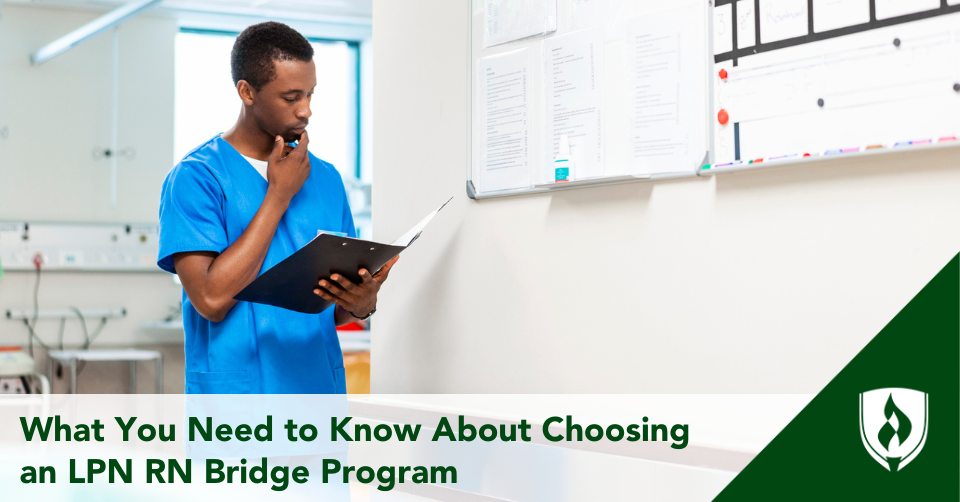
Whether you’ve been working as a licensed practical nurse (LPN) for decades or have just started to get established in the role, you know one thing: You’re ready to make a change.
As much as you love some of your patients and coworkers, the prospect of taking on new nursing challenges while expanding your overall earning potential has become increasingly appealing.
But you don’t want to be stuck at square one when it comes to education. The fundamental skills you learned in nursing school, the same skills you apply every day in your current role, will still be useful as a registered nurse (RN).
An LPN-to-RN bridge program can help solve this concern—and in this article we’ll help lay out the most important information to consider before picking a program.
Take the next step with our Professional Nursing (ADN) program—ideal for LPNs.
Learn More About Our LPN to RN BridgeWhat is an LPN-to-RN bridge program?
Given the mess of “alphabet soup” that comes with nursing credentials and programs, you’re probably wondering where exactly an LPN-to-RN bridge fits into the big picture. This nursing school option is really just another path into an associate degree in nursing (ADN) program—you’re learning the same things as other registered nurses, but with the understanding that you’ve already built that practical nursing foundation.
This streamlined path is reserved for students with an unencumbered practical nursing license. By taking this route, licensed practical nurses have the ability to cut down on their overall time to completion by receiving credit for previous nursing training and general education courses. For example, Rasmussen University LPN-to-RN program students can complete their nursing degree program is as few as 18 months.1
What should I consider when evaluating an LPN-to-RN bridge program?
Before you fire up and start applying to programs, conduct a little research first. Give some thought to the following areas.
1. Is the professional nursing program accredited?
While your first thoughts might be more focused on the cost and location of a program, the accreditation status of a nursing program is an important, yet often-overlooked, factor.
The accreditation of a registered nursing program depends on it meeting certain standards of educational quality. Accredited programs are continually reviewed to ensure those standards are being upheld.
But accreditation isn’t just a gauge of a program’s overall educational quality—it can also factor into your ability to obtain state licensure. Before you enroll in a program, look into your state’s registered nursing licensure requirements to see if the State Board of Nursing accepts the school’s accreditation for graduates of the nursing program to sit for the NCLEX-RN®.2
Many require applicants to complete a program accredited by either the Accreditation Commission for Education in Nursing (ACEN®) or the Commission on Collegiate Nursing Education (CCNE) in order to sit for the National Council Licensure Examination (NCLEX-RN®).
2. Do I have everything needed for admission?
If you think back to your last go-around in nursing school, it shouldn’t come as much of a surprise that you’ll need to get a few things in order before gaining admission to a program. Requirements will vary by program; for example, you may need to earn a passing score on an entrance exam like the Assessment Technologies Institute (ATI®) Test of Essential Academic Skills (TEAS). This test is an assessment of your reading, mathematics, science and English proficiency. If you’re concerned, our article “Don’t Fear the TEAS Test: 5 Common Questions Answered” may help.
Additionally, prospective students will likely need to pass a background check, be up to date on their immunizations and obtain transcripts of their previous nursing courses. Fortunately, many of these requirements should be relatively simple to meet if you’re already working in professional nursing as an LPN.
3. Can I afford this program?
It’s true that becoming a registered nurse may improve your earning potential long-term, but you’ll still want to consider your more immediate financial plans.
With in-person lab work and clinical rotations playing a major part in most ADN program curriculum, you’ll likely have to scale back your work hours or put employment on hold for the duration of your education—so do your best to plan ahead.
Take time to seek out scholarship and financial aid opportunities, and look into affordable health insurance plans. Plus, ask your current employer or nursing department about tuition reimbursement programs. They may seem minor, but every little bit will help.
4. What support will be available to me?
If it’s been a while since your last experience in a college classroom, you might be feeling a little apprehensive about getting back into the routine. Academic and technical support systems can help make this transition go as smoothly as possible—so don’t be afraid to ask around and learn more about what’s available.
Rasmussen University, for example, offers a variety of support services to help facilitate student learning, including a dedicated team of library and learning services professionals, academic advisors, career services advisors and student tutors. That’s not to mention dedicated Classroom IT Support for whenever you may need assistance with technical troubles.
5. Will campus locations work for my schedule?
As we mentioned before, you’re likely to be spending a fair amount of time on campus as you complete your nursing coursework—and that means travel time could also be a factor. Make the trip to the campuses you’re considering and make an honest assessment of whether that commute can reasonably be done a regular basis.
While it’s true this is a relatively small factor in the grand scheme of things, a long commute can make your nursing school experience more difficult. It’s easy to overlook this when evaluating your options, but it will make a big impact on your experience.
6. Who will my instructors be?
As an LPN, this isn’t your first rodeo when it comes to working with patients—and you’ve maybe seen firsthand how “by the book” nursing knowledge can begin to falter in real-world situations. That’s a big part of why it helps to learn from instructors who have plenty of nursing experience. They know how to apply what you’re learning to practical situations and can draw from their experience to give examples of why something should be done.
Your instructors can also be an excellent asset for when the time comes to find a registered nursing job—they have plenty of connections and may be willing to lend you a hand in getting established.
Start your search for an LPN RN bridge program
As you can see, there’s a lot you’ll want to consider when making the jump from LPN to RN—but don’t let it hold you back.
Becoming a registered nurse can make a huge difference in your nursing career. Take some time to evaluate the information above so you can make an informed decision. And know that you can always call an admissions representative with a list of questions. Sometimes it’s faster to connect with someone to get all the details you need in one swoop.
Check out the Rasmussen University Professional Nursing program page for more details or to connect with a nursing representative who can answer your questions.
1 Completion time is dependent on transfer credits accepted and the number of courses completed each term.
2 NCSBN, (date accessed 10/17/2023) https://www.ncsbn.org/nursing-regulation/education/approval-of-nursing-education-programs.page
ACEN® is a registered trademark of Accreditation Commission for Education in Nursing, Inc. AKA ACEN CORPORATION NEW YORK 3390 Peachtree Rd., NE Suite 1400 Atlanta GEORGIA 30326
NCLEX-RN® is a registered trademark of National Council of State Boards of Nursing, Inc. CORPORATION PENNSYLVANIA 111 East Wacker Drive Suite 2900 Chicago ILLINOIS 60601
ATI® is a registered trademark of Assessment Technologies Institute, L.L.C. LIMITED LIABILITY COMPANY WASHINGTON 7500 W. 160th Street Stilwell KANSAS 66085
APA® is a registered trademark of AMERICAN PSYCHOLOGICAL ASSOCIATION, INC. NON-PROFIT CORPORATION D.C. 750 First Street N.E. Washington D.C. 200024242
EDITOR’S NOTE: This article was originally written by Will Erstad and published in September 2019. It has since been revised for 2023.




